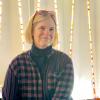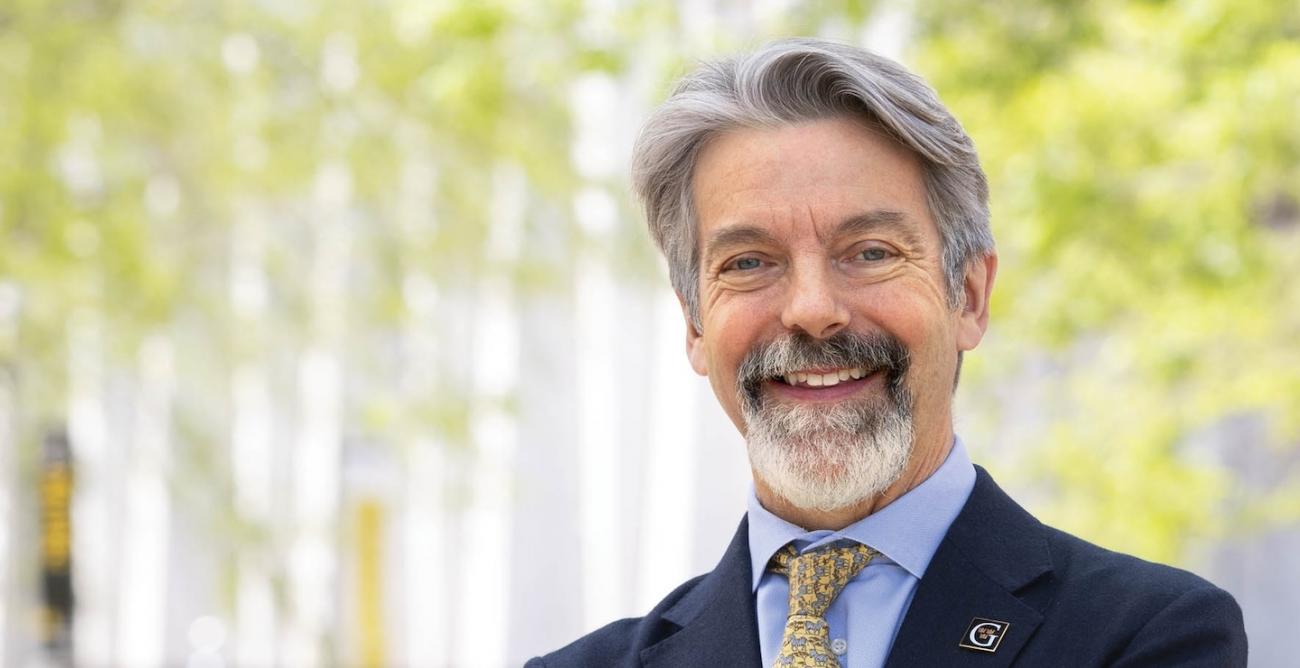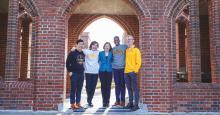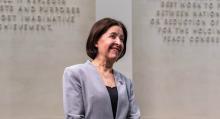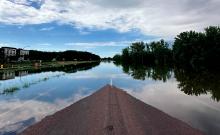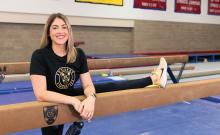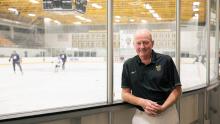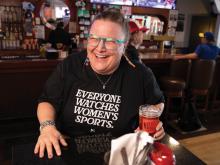It’s always a great day to be a Gustie, but most of us wouldn’t consider a nearly snowless winter our most aesthetically golden of seasons. And yet, on the drive south from MSP- International Airport to his campus interview, past the bare trees and brown ground and frozen grass of the Minnesota River Valley, presidential interviewee John Volin couldn’t help but be warmed. “For me, it was coming home. And as we came up the Hill, I thought, ‘I want to be here.’” Gustavus wanted him to be here, too. And on a bluebird day in May, with the crabapple trees blossoming, he dropped by campus again, where he was introduced to approximately 300 students, faculty, and staff for the first time as the College’s next leader. Now, as fall semester begins, here he is: Dr. John Volin, 18th President of Gustavus Adolphus College.
•
He was born and raised just over the Minnesota border, in Sioux Falls, SD, the descendant of the state’s early colonizing settlers. (There’s even a Volin, SD, population 158.) He is the youngest of eight siblings, six of whom still live in South Dakota. His roots are in the plains and rivers and trees of our shared geography.
He attended South Dakota State University, as was family tradition. He went pre-med; his father was a doctor. “I had a lot of fun in college. Maybe too much fun?” he says with a sly smile. But there was that one ecology class—and from then on, “I knew I loved plants. I loved all of ecology.” He stayed on at SDSU for a master’s in Agronomy, then headed to the woods of Wisconsin for a PhD in Forestry at the University of Wisconsin-Madison. He left there for the coastal subtropical ecosystems of Florida Atlantic University in 1995, serving for more than a decade as a professor and program director in biological and environmental sciences. Then, it was on to the eastern hardwood forest of the University of Connecticut to be a professor and department head in natural resources and the environment, and to develop and direct undergraduate interdisciplinary curricula. He left as a vice provost for academic affairs and moved to the North Woods and the University of Maine, where he has been Executive Vice President for Academic Affairs and Provost since 2020.
“I’m a plant person,” he says. That’s classic Midwestern undersell. He is a researcher and a professor who has worked on every continent but Antarctica and with every level of college student, first-year to post-doc. He is a college administrator with extensive strategic planning and higher education management experience. And he is a leading national expert in interdisciplinary approaches to undergraduate higher education. Gustavus is new to him, and he to Gustavus. Together, we couldn’t be on more familiar territory.
The fact is, we've never needed liberal arts education more.
“I certainly knew about Gustavus growing up in Sioux Falls,” he says. “I knew its strong liberal arts reputation even back then, and the focus on the whole student.” As he grew in his higher ed career, he noticed that colleges that work to improve students’ well-being also improve students’ outcomes for their careers and lives of leadership.
Gustavus, as a mission-driven institution, has been creating well-rounded whole people since its humble origins in the Swedish Lutheran tradition. Turns out we’re trending. “A lot of colleges are starting to have that focus on ‘the whole student,’” Volin says. “That is the foundation of Gustavus, and it’s something that I care deeply about.”
He plans to lean into the intrinsic factors of a college student’s time here: their sense of belonging and purpose, the development of their identity and agency in the world, and their authentic, caring relationships across all strata of college life, from roommate to college president.
“Often colleges focus on extrinsic factors like graduation rate, retention, and the time it takes one to graduate,” he says. “Those factors are really important. But they take care of themselves if you take care of the intrinsic factors.” In other words: Considering students’ long-term well-being isn’t just the right thing to do for students. It’s the right thing to do for the next generation workforce and for the future of this college in a competitive higher education marketplace. Gustavus’s “whole student” tradition is very good for the world, and it also happens to be very good business.
“The fact is, we’ve never needed liberal arts education more.”
•
Time to dig in. He’s excited about Gustavus’s new curriculum, including the Signature Experience. (See page 16.) While interviewing, he was blown away by the innovation and pace with which our faculty responded to changes in the social, emotional, and intellectual needs of students. “It shows to me that faculty and administration really care about their students. They honor traditions and they push boundaries and innovate.”
Step one will be mixing into the rich Gustavus ecosystem to create a strategic plan for the college. “It will be a collaborative effort as we move forward. Shared governance is sacrosanct,” he says. He relishes “the creative process of coming together, how at the end of the day, it’s never just one person’s idea.” This first year, find him exploring campus from the inside out, next to his wife, Valeria, a fellow academic and researcher, their service-dog-in-training, Sofia, and (occasionally) their many children and grandchildren. They’ll live on campus in the President’s Home. Students will see and know them every day. There is much to do, of course, and so much to learn about how Gustavus has been growing whole students into whole people for 163 years. And there is so much to envision about how the College will continue to grow in that mission, too.
Here, back in his home of the Midwest, he will hit the ground listening.
A SHORT LIST FROM A LONG CURRICULUM VITAE
President Volin comes with decades deep in higher education, beginning as a professor. Just some of the highlights.
Research on invasive species and restoration ecology in the Florida Everglades led him to ecosystems around the world. | Led a $45 million student success and retention initiative to establish programs to improve student success through connection and engagement. | Served on numerous national boards and committees, from the NCAA Division I Committee on Academics to the Executive Committee of the Council on Academic Affairs of the Association of Public & Land-Grant Universities. | Awarded more than $30 million to teach and research on every continent but Antarctica. | Co-founder and senior advisor of the digital magazine LearningWell, examining how higher ed experiences lead to improved student well-being. | Founder of the Natural Resources Conservation Academy at the University of Connecticut—conservation education for high school students. | Co-founder of a co-enrollment program to help community college students pursue four-year degrees.
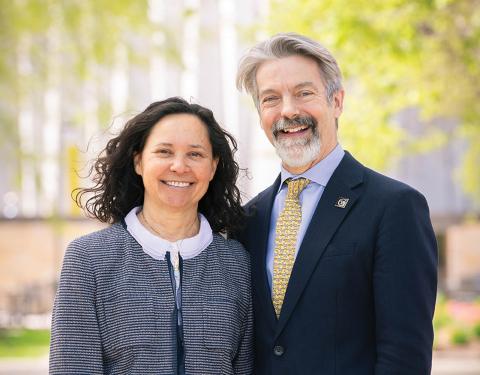
INTERDISCIPLINARY PARTNERS | Valeria Volin trained as a forest ecologist in her native Italy at the University of Padua, home to the world’s first university botanical garden. (Sidenote: Galileo taught there.) She met John Volin in graduate school at the University of Wisconsin- Madison. Together and separately they have researched and published on invasive botanical species, forest management, vegetation in the Everglades, and plant biodiversity. Her research also includes forest management in the Italian Dolomites. A passionate lifelong learner, she led a $400 million campaign to buy back Florida land for preservation while raising their children. Learning and the natural world are her vocations, both of which she shares with her husband. Together, they are a family, intellectual, and presidential package.
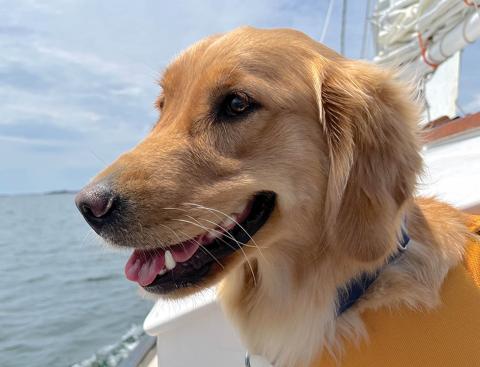
AND INTRODUCING SOFIA | The youngest of the Volin children, Sofia turned one in June. She continues to be enthusiastically devoted to her training as a therapy dog. “She’s pretty amazing. She loves people and aggressively chasing a ball,” President Volin says. “There’s never been a time where a student hasn’t gotten a smile out of her.”

